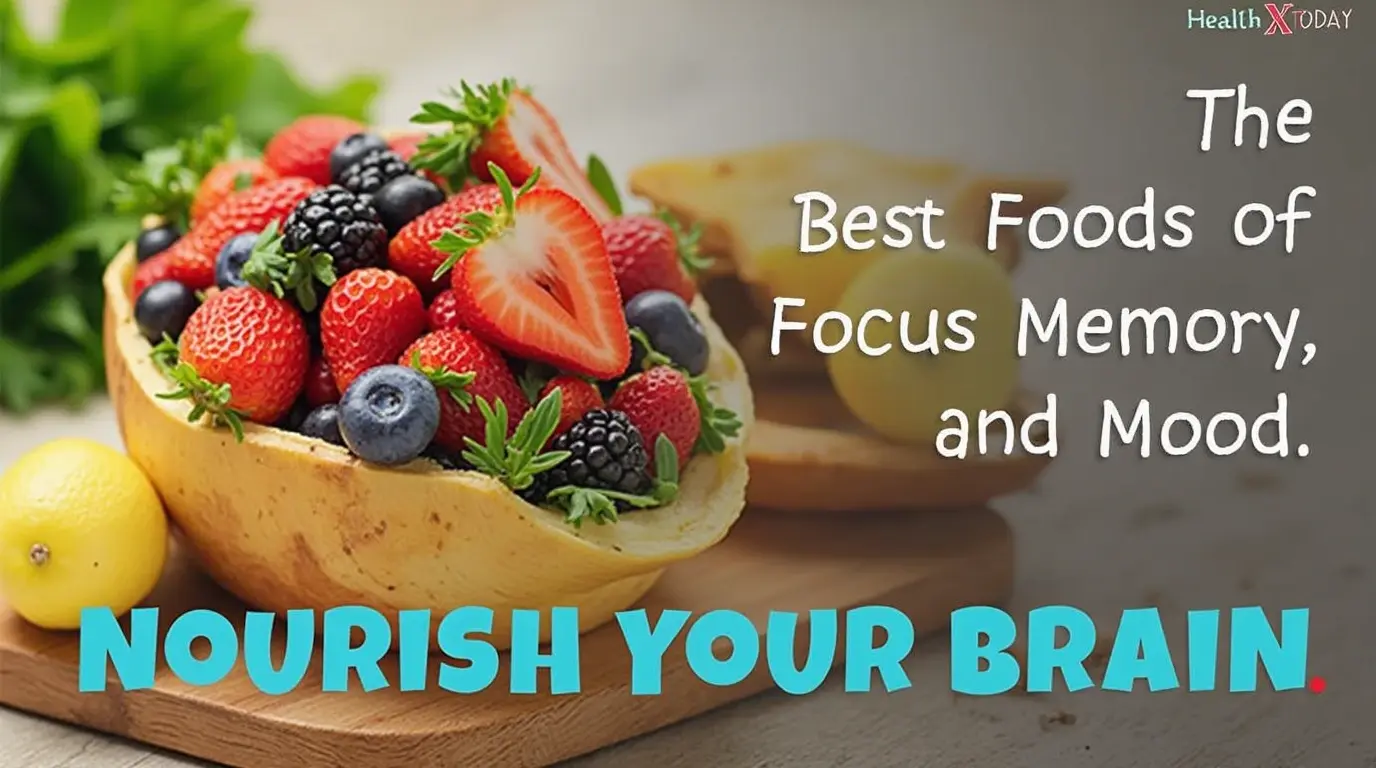We envision a world where everyone has the tools and knowledge to live a balanced, healthy, and fulfilling life. By providing reliable resources, personalized programs, and community support, we aim to be a beacon of hope for those on their health journey.
Table of Contents
Introduction to the Connection Between Food and Health Nourish Your Brain
The interconnection between food choices and overall health outcomes has garnered considerable attention in recent years. An increasing body of research suggests that the type of food we consume plays a pivotal role in shaping both our mental and physical well-being. Nutrition is not just about caloric intake; it encompasses a complex interaction of various nutrients that directly influence our bodily functions and emotional states.
Foods rich in essential vitamins, minerals, and antioxidants can significantly enhance mood and promote cognitive function. For instance, omega-3 fatty acids, commonly found in fish such as salmon, have been linked to a reduction in symptoms of depression and cognitive decline. Similarly, foods high in antioxidants, such as berries, combat oxidative stress, which is known to adversely affect brain health. By incorporating these nutrient-dense foods into our diets, we can create a positive impact on our mental well-being.
In addition to mental health, the relationship between diet and physical health cannot be overlooked. Consuming a balanced diet filled with whole grains, lean proteins, healthy fats, and a variety of fruits and vegetables provides the body with the energy it needs to function effectively. Adequate nutrition supports various physiological processes, including immune function, heart health, and weight management. Consequently, individuals who make informed food choices often experience improved energy levels and overall health.
As we explore the intricate links between food and health, it becomes evident that a well-balanced diet is crucial for sustaining both physical performance and mental clarity. Emphasizing wholesome food options not only enhances quality of life but also fosters resilience against various health issues.
The Role of Nutrients in Mental Health
The relationship between nutrition and mental health is an area of increasing research interest, emphasizing the profound impact that specific nutrients have on brain function and emotional well-being. A balanced diet rich in certain nutrients plays a pivotal role in the maintenance and enhancement of mental health. Among these nutrients, omega-3 fatty acids stand out due to their essential role in brain structure and function. Found in fatty fish, flaxseeds, and walnuts, omega-3s are linked to reduced symptoms of depression and anxiety, supporting the notion that a diet incorporating these fats can promote emotional stability.
Furthermore, antioxidants, which are abundant in fruits and vegetables, play a crucial role in protecting the brain from oxidative stress. This stress can lead to cell damage and contribute to cognitive decline. Vitamins such as B6, B12, and folate are vital as they contribute to neurotransmitter synthesis, which is foundational for mood regulation. Deficiencies in these B vitamins have been associated with increased levels of psychological disorders, including depression.
Minerals like zinc and magnesium are equally important in supporting mental health. Zinc deficiency has been linked to increased anxiety and depressive symptoms, while magnesium plays a role in regulating neurotransmitter systems, which directly influence mood. Studies suggest that adequate intake of these minerals can significantly reduce symptoms of both anxiety and depression.
In conclusion, the connection between nutrition and mental health is undeniable. Maintaining optimal levels of omega-3 fatty acids, antioxidants, B vitamins, and essential minerals is crucial for supporting mental well-being. Deficiencies in these nutrients can lead to a myriad of mental health issues, highlighting the importance of a well-rounded diet in fostering both mental and physical health. For further reading, exploring current research articles and trustworthy resources can provide additional insights into the role of nutrition in mental health.
Top Foods for Enhancing Brain Function
Maintaining optimal cognitive function is essential for overall mental health, and certain foods have been shown to have significant benefits in this area. Incorporating these foods into your diet can enhance brain function and improve memory, focus, and mental agility.
Fatty fish is one of the top foods recommended for brain health. Rich in omega-3 fatty acids, particularly EPA and DHA, these nutrients are crucial for maintaining the structure and function of brain cells. Studies suggest that regular consumption of fatty fish, such as salmon, mackerel, and sardines, can reduce the risk of cognitive decline and Alzheimer’s disease (source: NCBI).
Berries, especially blueberries, are another excellent choice for enhancing cognitive function. These fruits are packed with antioxidants, which can help combat oxidative stress and inflammation in the brain. Research indicates that the compounds found in berries may improve communication between brain cells, leading to better memory and cognitive performance (source: Frontiers in Neuroscience).
Leafy greens, including spinach, kale, and broccoli, are high in nutrients like vitamin K, lutein, and beta carotene, which are essential for brain health. These vegetables contribute to cognitive function by promoting neural growth and protecting brain cells from degeneration. A study published in “Alzheimer’s & Dementia” suggests that individuals who consume a greater amount of leafy greens experience slower cognitive decline (source: NCBI).
Nuts, particularly walnuts, are another potent ally for brain function. They are a rich source of antioxidants and healthy fats, which are vital for brain health. Evidence shows that regular nut consumption can enhance memory and cognitive performance, making them a perfect snack for those looking to improve their brain health (source: ScienceDirect).
Incorporating these brain-boosting foods into your daily diet can lead to noticeable improvements in cognitive function. By prioritizing these options, individuals can effectively support their mental health and overall well-being.
Foods That Promote Physical Health
Maintaining optimal physical health is significantly influenced by the foods we consume. An emphasis on incorporating a variety of nutrient-rich foods into our diets can lead to improved overall well-being. Whole grains, legumes, fruits, and vegetables are key players in promoting physical health due to their considerable health benefits.
Whole grains, such as brown rice, quinoa, and oats, are excellent sources of complex carbohydrates and fiber. Fiber aids in digestion and helps regulate blood sugar levels, thus reducing the risk of heart disease. Whole grains also contain B vitamins, which play vital roles in energy metabolism, making them essential for maintaining energy levels throughout the day.
Legumes, including beans, lentils, and chickpeas, are high in both protein and fiber, contributing to muscle health and ensuring a healthy digestive system. The protein in legumes is particularly crucial for those adhering to plant-based diets, as it provides the necessary building blocks for bodily functions. Additionally, legumes are rich in essential minerals like iron and magnesium, which support various physiological processes.
Fruits and vegetables are indispensable components of a balanced diet, providing an array of vitamins, minerals, and antioxidants that help combat oxidative stress in the body. The antioxidants found in fruits, such as berries, citrus fruits, and apples, are linked to lower inflammation levels and improved heart health. Dark leafy greens, like spinach and kale, contribute vitamins A, C, and K, which are paramount for immune support and bone health.
Moreover, incorporating these food groups into daily meals not only enhances physical health but also fosters better nutritional practices. The synergy created by a diet rich in whole grains, legumes, fruits, and vegetables can lay the foundation for a more energetic and resilient body. In conclusion, prioritizing these foods can significantly benefit physical health outcomes by promoting optimal digestion, heart health, and sustained energy levels.
Integrating Superfoods into Your Diet
Superfoods are defined as nutrient-dense foods that offer substantial health benefits, ranging from improved energy levels to enhanced mental clarity. Incorporating superfoods into your diet is an effective way to bolster both your physical and mental health. Not only do they provide essential vitamins and minerals, but they also contain antioxidants and other compounds that can help protect and promote overall well-being. Some popular examples of superfoods include quinoa, kale, and acai berries.
Quinoa, often referred to as a complete protein, is an excellent grain substitute that is rich in amino acids, fiber, and various vitamins. Incorporating quinoa is simple; it can be used as a base for salads or served alongside vegetables and lean proteins. Kale, another powerhouse superfood, is packed with vitamins A, K, and C. Whether you choose to include it in a smoothie, use it as a salad base, or sauté it as a side dish, the options are plentiful. Acai berries, known for their antioxidant properties, can enhance smoothies, yogurt, or even be enjoyed in bowl form topped with granola and fresh fruit.
To seamlessly integrate these superfoods into your meals, consider starting your day with a green smoothie filled with kale and a handful of acai powder. For lunch, try a quinoa salad mixed with various vegetables, dressing it with olive oil and lemon juice for added flavor. Dinner can feature a stir-fry that incorporates sautéed kale and quinoa, topped with grilled chicken or tofu. These recipes not only highlight the versatility of superfoods but also offer a visual feast.
For further inspiration, check out our meal ideas that suggest delicious preparations and combinations using these superfoods. Additionally, external nutrition guides can provide valuable information on the benefits and preparation of each superfood, enhancing your knowledge and cooking skills as you pursue a healthful lifestyle.
Foods to Avoid for Better Mental and Physical Health
When considering optimal mental and physical health, it is crucial to be aware of certain foods that may adversely impact well-being. Predominantly, processed foods are a significant concern. These foods often contain high levels of refined sugars, unhealthy fats, and artificial additives that can exacerbate inflammation and hinder cognitive function. The consumption of processed foods has been associated with mood swings, anxiety, and depression, as they can lead to fluctuating energy levels and impair the brain’s ability to regulate neurotransmitters effectively.
Moreover, high sugar intake is particularly detrimental to both mental and physical health. Foods laden with sugar can lead to rapid spikes in energy levels followed by drastic crashes, which may contribute to feelings of irritability and fatigue. Excessive sugar consumption is also linked to chronic health conditions such as obesity and diabetes, which can further complicate mental health. For this reason, it is advisable to limit sugary snacks and beverages in favor of whole foods that provide sustainable energy.
Trans fats are another category that warrants caution. Often found in fried foods, baked goods, and margarine, trans fats are known to promote inflammation and have been shown to adversely affect cardiovascular health. Nourish Your Brain The consumption of trans fats can lead to an increase in bad cholesterol levels while decreasing good cholesterol, which may result in various health issues over time. Nourish Your Brain Instead of trans fats, individuals are encouraged to opt for healthier fat sources, such as avocados, nuts, and olive oil, which support cognitive function and overall health.
In summary, avoiding processed foods, excessive sugars, and trans fats can significantly enhance both mental and physical health. Nourish Your Brain By making informed dietary choices and opting for whole, nutrient-dense alternatives, individuals can adopt a healthier lifestyle that supports optimal well-being.
The Importance of Hydration
Hydration plays a crucial role in maintaining both mental and physical health. The human body is composed of approximately 60% water, and adequate hydration is essential for optimal functioning of all bodily systems. Insufficient water intake can lead to various negative effects, impacting cognitive function, mood stability, and overall physical performance.
From a mental health perspective, staying well-hydrated is linked to improved concentration, enhanced memory, and better decision-making capabilities. Dehydration can lead to cognitive decline, fatigue, and mood disturbances such as anxiety and irritability. Nourish Your Brain Furthermore, individuals who consume sufficient water generally report lower levels of stress and improved emotional well-being. Nourish Your Brain This demonstrates that hydration is not merely a physical necessity but a fundamental component of mental health as well.
Physically, water is essential for regulating body temperature, transporting nutrients, and facilitating digestion. Nourish Your Brain It aids in the absorption of essential vitamins and minerals and helps to remove toxins from the body. Nourish Your Brain Hydration is particularly important for athletes and individuals engaging in regular physical activity, as it assists in maintaining stamina and prevents fatigue during exercise.
To ensure proper hydration, it is advisable to drink water consistently throughout the day, rather than waiting until thirst sets in. Nourish Your Brain A general guideline suggests aiming for at least eight 8-ounce glasses of water per day, although individual needs may vary based on activity levels, climate, and overall health. Incorporating water-rich foods, such as fruits and vegetables, into your diet can also contribute to hydration. Nourish Your Brain For further guidance on hydration and its importance, you may refer to reliable resources such as the National Academies of Sciences and the Centers for Disease Control and Prevention.
Creating a Balanced Meal Plan
Developing a balanced meal plan is essential for promoting both mental and physical health. A well-structured plan not only optimizes nutrient intake but also helps maintain energy levels, enhances mood, and supports overall well-being. Nourish Your Brain To begin, aim to incorporate a variety of food groups, including fruits, vegetables, whole grains, lean proteins, and healthy fats. Nourish Your Brain Each food group offers specific health benefits; for instance, fruits and vegetables are rich in vitamins and antioxidants, while lean proteins support muscle health and repair.
When considering portion sizes, it is crucial to adopt guidelines that reflect individual dietary needs. A common recommendation is to fill half of your plate with fruits and vegetables. Nourish Your Brain Allocate a quarter for whole grains, such as brown rice or quinoa, and the remaining quarter for lean proteins, like chicken or tofu. Incorporating healthy fats, such as avocados or olive oil, can further enhance the nutritional profile of your meals. Utilizing tools like the MyPlate model can provide a helpful visual guide for portion planning.
Meal preparation plays a significant role in maintaining a balanced diet. Consider setting aside time each week to prepare meals in advance. This not only saves time during busy weekdays but also ensures that healthy options are readily available. Nourish Your Brain When meal prepping, focus on creating versatile components that can be mixed and matched throughout the week, such as roasted vegetables, pre-portioned grains, and various proteins. Nourish Your Brain , explore external resources such as meal planning blogs and tools for inspiration and fresh ideas.
Incorporating these strategies into your routine will facilitate the creation of a balanced meal plan, potentiate healthier choices, and ultimately improve both mental and physical health. Nourish Your Brain By regularly revisiting and adjusting your plan, you can ensure that it meets your evolving needs and preferences.
Conclusion: The Journey to a Healthier You
Throughout this blog post, we have explored the significant role that food plays in enhancing both mental and physical health. Nourish Your Brain The connection between what we consume and how we feel is more evident than ever, and adopting a balanced diet can yield substantial benefits. Nutrients found in various foods not only support our bodily functions but also contribute profoundly to our mental well-being. Nourish Your Brain Foods rich in omega-3 fatty acids, antioxidants, and vitamins can boost brain health, while a diverse intake of fruits, vegetables, lean proteins, and whole grains lays the foundation for physical vitality.
The first step towards a healthier lifestyle does not always require drastic changes. Nourish Your Brain By incorporating small adjustments into your daily routine, such as opting for leafy greens over processed snacks, you can gradually improve your nutritional intake. Emphasizing the importance of hydration and mindful eating can also significantly enhance your overall health. Nourish Your Brain Remember, the journey to a healthier you is not a sprint; it is a marathon that requires patience and consistency. Nourish Your Brain Finding joy in cooking and experimenting with new recipes can further motivate individuals to make healthier choices.
It is also crucial to recognize that everyone’s health journey is unique. Therefore, it’s essential to listen to your body and make modifications that suit your personal needs. Nourish Your Brain As you embark on this path, consider utilizing available resources, such as nutritionists or dietitians, who can offer tailored advice. Nourish Your Brain We encourage you to explore further reading and practical tips on topics like meal planning and understanding food labels, enhancing your knowledge about nutrition.
Ultimately, choosing the right foods is an investment in your long-term health. Nourish Your Brain Wirth time, the cumulative effect of a balanced diet can lead to improved mood, increased energy levels, and enhanced overall well-being. Commitment to this journey is the key to unlocking the full potential of your mental and physical health.






